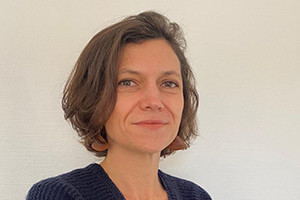Géraldine Duthé, senior researcher
Géraldine Duthé is a senior researcher at the units DEMOSUD - Demography of the Global South and Mortality, Health and Epidemiology and the International Perspectives research group.
What path brought you to INED?

After specializing in science for my high school baccalauréat, and consistent with my interest in the humanities and social sciences, I studied mathematics for social sciences at university. In my third year I discovered I had a strong interest in demography as a discipline. At that time I wanted to become a professional demographer, but my desire to continue learning, and my initial professional experiences at INED, first as an intern, then as a temporary staff member, together with the encouragements of my teachers, led to me to become a researcher. I wanted to work in the health field, and after doing my Master’s Degree I applied for a PhD scholarship at the Muséum National d’Histoire Naturelle to study what was then a new increase in mortality from malaria in a rural Senegalese population group, under the supervision of Gilles Pison. This led to being hosted at INED, where I enjoyed excellent conditions for researching and writing my thesis, specifically by joining INED’s “Population and Development” and “Mortality, Health and Epidemiology” research units—a greatly enriching experience. I was hired as a researcher at INED in 2006.
What do you work on at the Institute?
My research bears primarily on obstacles to the health transition in sub-Saharan Africa, where mortality is still high but also difficult to measure due to a lack of vital statistics data. In the framework of what are usually international collaborative projects, I analyze probable-cause-of-death statistics collected at demographic tracking sites using information collected from family members of the deceased. I also collaborate on research studies based on national surveys and censuses. Currently I am particularly interested in the rise of non-contagious diseases and chronic health problems in adults. Little is known on this, and many people receive no treatment.
Moreover, together with Valérie Golaz I am now co-heading INED’s “Demography of the Global South” research unit. This is highly stimulating coordination work, both scientifically, as it involves exchanges and structuring unit researcher studies, and institutionally, because we are working in the framework of national and international partnerships and collaborative projects. Within the unit, Valérie and I work closely with the unit’s research assistant and exchange regularly with the Institute’s administrative services and the Director’s Office to ensure optimal unit operation.
And this last year, together with Olivia Samuel and Anne Solaz, I have been working as co-editor-in-chief of the journal Population. This is a great honor for me given the importance of this journal for demographers and all members of the scientific community interested in population studies in France and the French-speaking world. We read article submissions and make an initial selection before sending those texts to the editorial committee and outside evaluators; we then manage revisions and validate the French and English versions of the journal. Running an entirely bilingual journal known for its scientific and editorial rigor raises many challenges around editorial policy and how best to promote the research. It’s extremely enriching.
What would you say is specific about INED?
At the international level, INED is a reference institution for population studies. The research done here is recognized and highly reputed, and I have the pleasure of learning from my colleagues about their research fields on a daily basis. Moreover, INED’s international policy has given me many opportunities to work abroad and to receive foreign PhD students and researchers here, including from Global South countries. It enables us to maintain and further develop our networks and collaborative work.
(Interview conducted in June 2021)
